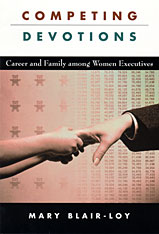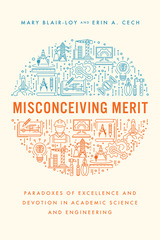
The wrenching decision facing successful women choosing between demanding careers and intensive family lives has been the subject of many articles and books, most of which propose strategies for resolving the dilemma. Competing Devotions focuses on broader social and cultural forces that create women's identities and shape their understanding of what makes life worth living.
Mary Blair-Loy examines the career paths of women financial executives who have tried various approaches to balancing career and family. The professional level these women have attained requires a huge commitment of time, energy, and emotion that seems natural to employers and clients, who assume that a career deserves single-minded allegiance. Meanwhile, these women must confront the cultural model of family that defines marriage and motherhood as a woman's primary vocation. This ideal promises women creativity, intimacy, and financial stability in caring for a family. It defines children as fragile and assumes that men lack the selflessness and patience that children's primary caregivers need. This ideal is taken for granted in much of contemporary society.
The power of these assumptions is enormous but not absolute. Competing Devotions identifies women executives who try to reshape these ideas. These mavericks, who face great resistance but are aided by new ideological and material resources that come with historical change, may eventually redefine both the nuclear family and the capitalist firm in ways that reduce work-family conflict.

In Misconceiving Merit, sociologists Mary Blair-Loy and Erin A. Cech uncover the cultural foundations of a paradox. On one hand, academic science, engineering, and math revere meritocracy, a system that recognizes and rewards those with the greatest talent and dedication. At the same time, women and some racial and sexual minorities remain underrepresented and often feel unwelcome and devalued in STEM. How can academic science, which so highly values meritocracy and objectivity, produce these unequal outcomes?
Blair-Loy and Cech studied more than five hundred STEM professors at a top research university to reveal how unequal and unfair outcomes can emerge alongside commitments to objectivity and excellence. The authors find that academic STEM harbors dominant cultural beliefs that not only perpetuate the mistreatment of scientists from underrepresented groups but hinder innovation. Underrepresented groups are often seen as less fully embodying merit compared to equally productive white and Asian heterosexual men, and the negative consequences of this misjudgment persist regardless of professors’ actual academic productivity. Misconceiving Merit is filled with insights for higher education administrators working toward greater equity as well as for scientists and engineers striving to change entrenched patterns of inequality in STEM.
READERS
Browse our collection.
PUBLISHERS
See BiblioVault's publisher services.
STUDENT SERVICES
Files for college accessibility offices.
UChicago Accessibility Resources
home | accessibility | search | about | contact us
BiblioVault ® 2001 - 2024
The University of Chicago Press









